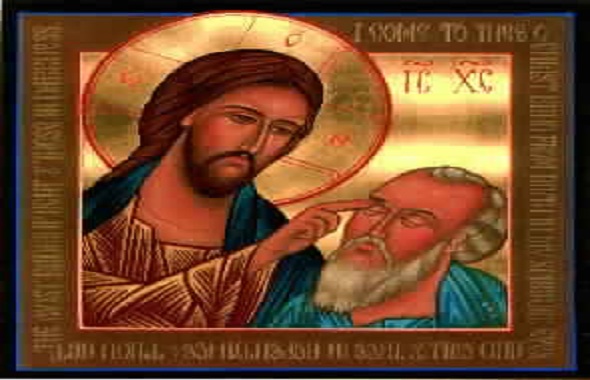The Healing Ministry of Jesus Christ
8 June 2017“…the Sun of Righteousness shall arise with healing in His wings” (Mal.4:2 ). “And He spoke to them about the kingdom of God, and healed those who had need of healing” (Lk.9:11 ).
After His baptism, our Lord Jesus Christ had ascended into the wild mountains above Jericho. There, He revealed to us what His kingdom would not be. He rejected every manifestation of worldly authority and rule, and revealed that the kingdom of God is that uncreated reign of God, manifested wherever the will of God is being done by those who accept His rule and place their faith in Him.
When our Saviour came down from the mount of temptation, He straight away went up to Galilee of the Gentiles and began to proclaim that the Kingdom of God was at hand. How did He demonstrate the presence of the Kingdom of God? By healing people. He announced the Kingdom, and revealed its nature by healing physical, mental and spiritual illness. The entire ministry of Christ, the Gospel of redemption, was a healing ministry, for redemption consists precisely in healing.
“And Jesus went about…preaching the Gospel of the Kingdom and healing all manner of sickness and disease among the people…and they brought to Him all peoples who were sick with various diseases and torments, and those who were possessed by demons and those that were mentally ill or palsied, and He healed them all” (Mt.4:23- 24 ).
Christ now begins to heal those who are ill; physically, spiritually and mentally, and to cast demons out of those who are possessed. By this, He first of all demonstrates that He has a higher authority, one not of this world, by which He overthrows the things of this world. The manifestation of this authority is not in political power, military might or great wealth; it is in the exercise of compassionate love, in the liberation of man from the bondage and marks of the fall. In this latter aspect lies a most profound revelation concerning the nature of Christ’s mission and the nature of the Holy Church: the Church is a spiritual hospital and redemption is a process of healing.
In the creation, man was not subject to illnesses of any sort nor to possession by demons. The fallen human nature is in a state of disharmony and internal division and chaos because of its separation from communion with God, because of sin (falling short of the mark). The ultimate result of the fallen nature is death, and the ultimate bondage, the fear of death. All these things are results of man’s loss of direct citizenship in and communion with the Heavenly Kingdom. Christ came to rescue and restore the human nature which, in Him, was once more perfect. Thus, it is only natural that, since He intended by His life, death and Resurrection to offer the healing of the whole nature of man, He should begin by healing the symptoms and marks of the fall. In this way, Christ brought the consciousness of people to an understanding of the nature of His Kingdom and of His own person. For, having proclaimed, “The kingdomof Heavenis at hand,” He immediately begins to overthrow the marks of those things which separate us, our nature, from that Kingdom. Finally, He overthrew the bondage of the fear of death (Hb.2:15 ), and ultimately even the existence of death will vanish in the full manifestation of His Kingdom (1Cor.15:26). Christ’s Kingdom began to be manifested in the healing and transformation of the “inner man” together with the physical man, so that he could be united to the whole body of the Church, now being re-formed in the very midst of the old, corrupted Israel. TheKingdom ofGod is formed by the liberation of man from the bondage of worldly corruption, and the transformation, and finally the transfiguration of the whole person into a new creature.
Thus the message of mankind’s redemption is preached in a manner which also explains the nature of redemption: the healing and restoration of the fallen, universal nature of mankind. The death and Resurrection of Christ makes union with that redeemed nature possible, through union with the perfect Human Nature in Christ.
That the message of redemption is a message of healing was made clear by Christ when He healed the paralytic: .”..When Jesus saw their faith, He said to the paralytic, Take heart son, thy sins are forgiven. At this, some of the lawyers said in themselves, `this fellow is blaspheming!’ Knowing their thoughts, Jesus said, `Why do you harbour evil thoughts in your hearts? Which is easier to say, `Thy sins are forgiven,’ or to say `Get up and walk’? But so that you may know that the Son of Man has authority on earth to forgive sins (and he said to the paralytic), `Arise, take up your pallet and go home'” (Mt.9:2-7 ).
Thus, the whole message of redemption and salvation is one of healing, and this healing is not divided into categories. Christ does not heal a part of the person, but the whole person: body and soul together as one. These two concepts are of the greatest importance to understanding the relationship between Orthodox Christianity and the development of medicine in the first centuries of our era: Christ’s ministry was not a juridical expedition, but a healing ministry; and this healing pertains to the complete, psychophysical organism that is man __ not to a part of that person only, but to the whole person, body and soul as one complete person.
This text was originally published in Archbishop Lazar’s book The Impact of Orthodox Christian Thought on Medicine (Synaxis Press, 2006). It is posted here with permission.







